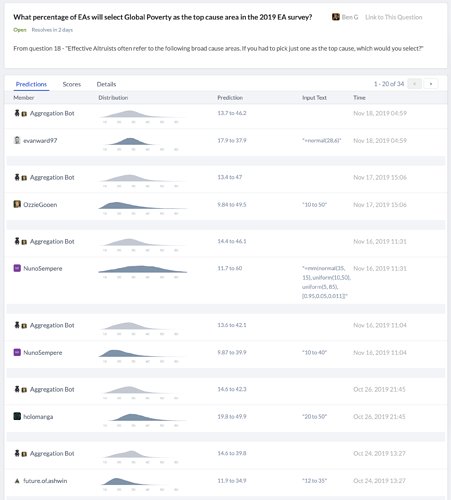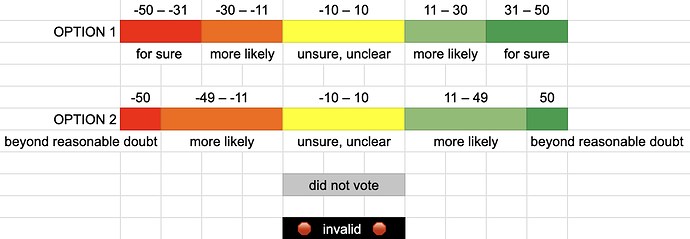Background
Two real-life examples, two amazing pieces of software created by an ingenious guy Ozzie Gooen. Check his LinkedIn: https://www.linkedin.com/in/ozzie-gooen-ab307226/
![]() Predicting stuff: Foretold.io
Predicting stuff: Foretold.io
![]() Estimating stuff: Guesstimate
Estimating stuff: Guesstimate
By putting ranges “20 to 50” and doing standard distribution on that, the overall result (multiple predictions) can be more accurate.
In real life, there are many uncertainties. Business plan could be more real if there was an estimate of 8-12 clients per day, as opposed to an arbitrary number.
Kleros weighting
- five options possible
- did not vote
- invalid
I prefer OPTION 2.
Currently using arbitrary numbers, over time we may figure out a better definition. See also the definition of fairness in this thread: Philosophical discussion about "code is the law" VS best interest of the justice and humanity?
Example 

The “beyond” votes are weighted at 1.5
2×1.5 + 3×1 = 6
6 is more than 2/3 threshold
The most popular vote is orange, these guys will be rewarded.
Those who voted red or yellow are not penalized because they were close enough.
It’s the light green guy who loses their stake.
Example 

As example 1, but there are no jurors who lose their stake, therefore no jurors winning.
Regular arbitration fees (paid by the parties) are paid to all jurors.
Example 

2×1.5 + 2×1 = 5
5 is more than 2/3 threshold
The most popular vote is yellow.
UNSURE - how to fairly redistribute rewards here?
Example 

Reds: 3 × 1
Greens: 2 × 1.5
Net value: 0
I think that yellow guys should be rewarded here. How exactly - not sure.
Also not sure how to resolve “invalid” votes and whether “did not vote” should be accounted to 2/3 threshold… (hopefully with harsher penalties there will be less “did not vote”)
Pros and cons (complexity)
A lot of properties of Kleros protocol are retained - incentivizing coherent voting, according to the truth.
Would the benefits of such a weighted vote provide enough incentive to switch?
Is the proposal good enough to warrant some experiments?
Guys starting a dispute can decide upfront what burden of proof and level of confidence is required.
Capital punishment? Require 12 jurors and 100% “beyond”.
Parking enforcement. Was the yellow line sufficiently visible under fallen leaves? Yeah, whatever, any burden of proof can do.
Discuss
Here you have the Google Doc - if you need to put some numbers and take screenshots.


